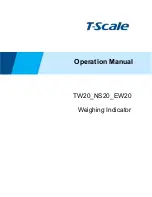
DSP resolver user manual
User Manual
Version 1.15
index
s
u
b
type
access
variable
values
notes
0x1010
0
U32
RO
co_store_params
6
1
U32
RW
Store all parameters
2
U32
RW
Store communication parameters
3
U32
RW
Store application specific
parameters
4
U32
RW
Store manufacturer specific
parameters
5
U32
RW
Store calibration parameters
6
U32
RW
Security key for calibration
parameters
Table 8.9: Store parameters object in the object dictionary
8.6
Restoring the default values to the object dictionary
The default values can be restored to the object dictionary a simple SDO write to the
co_restore_params
(0x1011) object. After the restore command parameters are restored to
the default values but they are not saved to the nonvolatile memory! So the configurator has
to execute the store command to save the restored values to the nonvolatile memory.
User is able to decide which type of parameters he wants to be restored. Parameters are
divided in 4 blocks: Communication objects, Manufacturer specific and Device profile
specific. The 4
th
block is calibration objects in most of the Axiomatic modules.
User is also able to save all parameters at once excluding the calibration parameters by
writing “daol” signature (0x64616F6C) to the sub 1 of
co_restore_params
object.
index
s
u
b
type
access
variable
valu
es
notes
0x1011
0
U32
RO
co_restore_params
6
1
U32
RW
Restore all parameters
2
U32
RW
Restore communication parameters
3
U32
RW
Restore application specific
parameters
4
U32
RW
Restore manufacturer specific
parameters
5
U32
RW
Restore calibration parameters
6
U32
RW
Security key for calibration
parameters
Table 8.10: Restore parameters object (0x1011)
8.7
Special functions and objects
CANopen also defines four specific protocols for synchronization, emergency indication,
time-stamp transmission and device boot-up indication.
Copyright
©
Axiomatic Technologies Oy
43/56














































